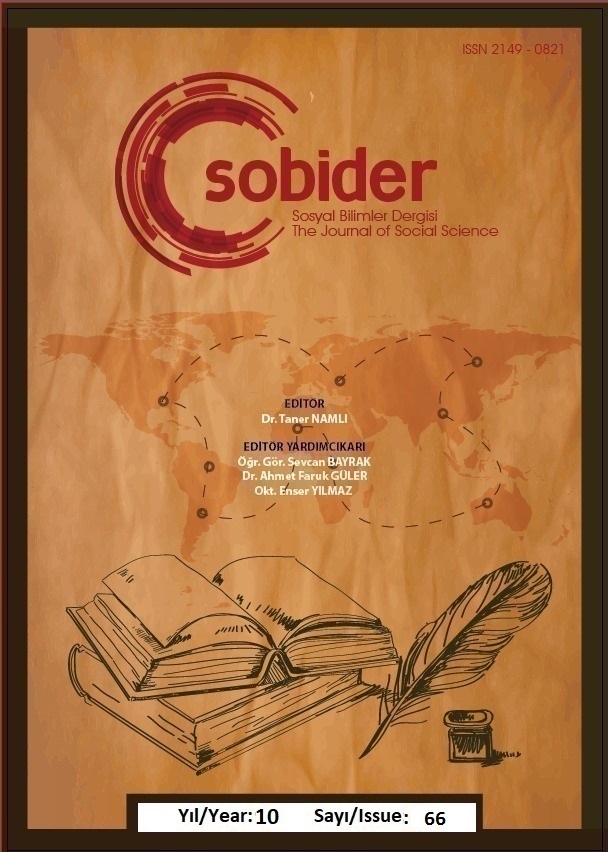ŞİDDETE UĞRAYAN VE UĞRAMAYAN KADINLARIN PSİKOLOJİK İYİ OLUŞ İLE SÜREKLİ ÖFKE DÜZEYLERİ ARASINDAKİ İLİŞKİNİN İNCELENMESİ
Author :
Abstract
Bu araştırmada şiddete uğrayan ve uğramayan kadınların psikolojik iyi oluş düzeyleri ile sürekli öfke düzeylerinin incelenmesi amaçlanmıştır. Bu araştırma da nicel araştırma modellerinden ilişkisel yöntem kullanılmıştır. Çalışmada şiddete uğrayan kadınlar, amaçsal örnekleme yöntemi ile şiddete uğramayan kadınlar ise kolayda örnekleme yöntemi ile seçilmiştir. Şiddete uğrayan ve uğramayan kadınların sürekli öfke durumları ve psikolojik iyi oluşlarının incelendiği bu araştırmaya 316’sı şiddete uğrayan ve 315’i şiddete uğramayan olmak üzere toplam 631 kadın dahil edilmiştir. Araştırma sonucunda şiddete uğrayan kadınların Sürekli Öfke Ölçeğindeki; sürekli öfke, öfke içe vurumu, öfke dışa vurumundan aldıkları puanlar şiddete uğramayanlardan yüksek, öfke kontrolü puanları ise düşük olduğu bulunmuştur. Şiddet uğrayan ve uğramayan kadınların Psikolojik İyi Oluş Ölçeği puanları arasında istatistik açısından anlamlı fark olduğu, şiddete uğrayanların daha düşük puan aldığı belirlenmiştir. Sürekli öfke ve psikolojik iyi oluş arasındaki ilişkiler ortaya konulmuş, şiddete uğrayan kadınların Sürekli Öfke Ölçeğindeki sürekli öfke, öfke içe vurumu ve öfke dışa vurumundan aldıkları puanlar ile psikolojik iyi oluş ölçeği puanları arasında istatistiksel olarak anlamlı ve negatif yönde korelasyon vardır. Kadınların öfke kontrolleri ve psikolojik iyi oluş puanları arasında anlamlı pozitif yönde ilişki tespit edilmiştir. Bu çalışmada şiddete uğramayan kadınların, Sürekli Öfke Ölçeğindeki sürekli öfke, sürekli öfke içe vurumu ve sürekli öfke dışa vurumu alt boyutlarından aldıkları puanlar ile Psikolojik iyi oluş puanları arasında istatistiksel anlamda negatif yönde ilişki bulunurken, şiddete uğramayan kadınların, öfke kontrolü puanları ile psikolojik iyi oluş puanları arasında da pozitif yönde anlamlı bir ilişki saptanmıştır. Yapılan çalışma, şiddetin kadınların psikolojik durumları ile şiddet düzeyleri arasındaki ilişkiye bakarak gelecekte etkin müdahale uygulanabilmesi açısından ruh sağlığı çalışanlarına ışık tutmaktadır.
Keywords
Abstract
In this study, it was aimed to examine the psychological well-being levels and trait anger levels of women who were and were not exposed to violence. In this study, the relational method, one of the quantitative research models, was used. In the study, the women who were subjected to violence were selected by the purposive sampling method, and the women who were not subjected to violence were selected by the convenience sampling method. A total of 631 women, 316 of whom were victims of violence and 315 who were not subjected to violence, were included in this study, which examined the trait anger and psychological well-being of women who were and were not exposed to violence. As a result of the research, in the Trait Anger Scale of the women who were subjected to violence; It was found that the scores they got from trait anger, anger-in and anger-out were higher than those who were not exposed to violence, and their anger control scores were lower. It has been determined that there is a statistically significant difference between the scores of the Psychological Well-Being Scale of the women who have been subjected to violence and those who have not, and those who have been subjected to violence have lower scores. The relationships between trait anger and psychological well-being have been revealed, and there is a statistically significant and negative correlation between the scores of the women who have been subjected to violence from trait anger, anger-in and anger-out in Trait Anger Scale and the scores of the psychological well-being scale. A significant positive correlation was found between the anger control and psychological well-being scores of women. In this study, there was a statistically negative correlation between the scores of the trait anger, trait anger-in and trait anger-out sub-dimensions in the Trait Anger Scale and the psychological well-being scores of the women who were not exposed to violence. There was also a significant positive relationship between them. The study sheds light on mental health professionals in terms of effective intervention in the future by looking at the relationship between the psychological state of violence and violence levels of women.
